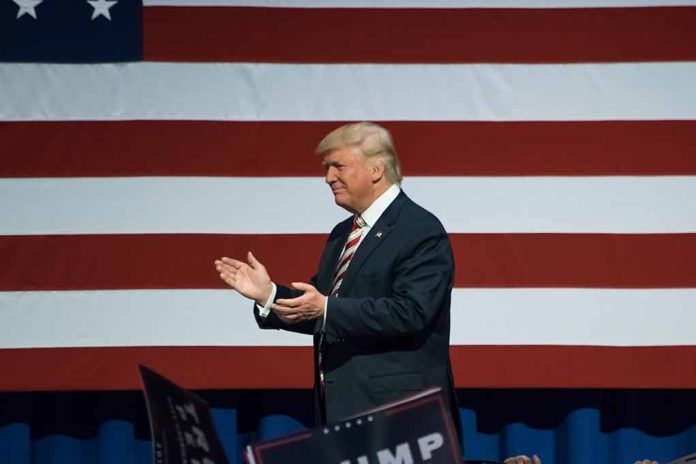
President elect Donald Trump has unveiled plans to swiftly end the Ukraine conflict, raising questions about the future of U.S. involvement in NATO and aid to Ukraine.
At a Glance
- Trump proposes reducing U.S. financial aid to Ukraine, urging Europe to take more responsibility
- He plans to appoint retired Lt. Gen. Keith Kellogg to oversee Russia-Ukraine peace talks
- Trump’s approach contrasts with President Biden’s, focusing on avoiding direct U.S. confrontation with Russia
- Future U.S. support for NATO may be contingent on European countries meeting financial commitments
- Major uncertainties remain about how Ukraine, Russia, and NATO allies will respond to Trump’s initiatives
Trump’s Vision for Ukraine and NATO
In a recent appearance on “Meet The Press,” President elect Donald Trump outlined his stance on NATO and U.S. involvement in Ukraine. Trump’s approach signals a significant shift from the current administration’s policies, emphasizing reduced American financial aid to Ukraine and calling for European nations to shoulder more responsibility in regional conflicts, particularly with Russia.
Trump’s plan includes appointing retired Lt. Gen. Keith Kellogg as a special envoy to oversee Russia-Ukraine peace talks. This move is part of a broader strategy to quickly end the war in Ukraine, which may involve freezing front lines and potentially cutting military aid to Ukraine to encourage negotiations.
NATO allies are focused on strengthening Ukraine's defense ahead of Donald Trump's potential return to office.
Secretary-General Mark Rutte emphasised that military support is crucial to ensure Ukraine enters peace talks from a position of strength.https://t.co/AjjSZtD1vH
— euronews (@euronews) December 3, 2024
European Responsibility and NATO Funding
A key aspect of Trump’s proposed policy is the insistence that Europe, rather than the U.S., should take a leading role in handling issues closer to their geographic domain. He criticized European countries for not matching U.S. financial support for Ukraine and emphasized that NATO member nations need to increase their financial contributions.
“Kellogg comes to Moscow with his plan, we take it and then tell him to screw himself, because we don’t like any of it. That’d be the whole negotiation.” –Putin ally Konstantin Malofeyev
Trump’s stance on NATO funding is not new. He claimed that his previous efforts led to increased financial contributions from NATO members, showcasing his capability to enhance NATO’s budget through assertive negotiation techniques. However, he now links future U.S. support for NATO to European countries meeting their financial commitments, expressing dissatisfaction with what he perceives as unfair trade practices.
Is NATO’s Support for Ukraine at Risk of Fading with Trump's Return?
“Very sadly, NATO and the West seem to be lining themselves up for the betrayal of Ukraine. Not inevitable but increasingly likely.” — Professor @MikeClarke2020s
Read more: https://t.co/uwEqFIaVEj
— War Studies (@warstudies) November 12, 2024
Uncertainties and Challenges
Major questions remain about how Ukraine, Russia, and NATO allies will respond to Trump’s peace initiatives. Ukrainian President Volodymyr Zelensky has expressed openness to diplomacy but remains committed to NATO membership, which could be a contentious issue in negotiations.
“Our army lacks the strength to do that. That is true. We do have to find diplomatic solutions.” – Zelensky
Russia’s military is making gains in eastern Ukraine, and it is unclear what incentives would persuade Moscow to agree to peace. The involvement of European NATO allies, who have played a significant role in supporting Ukraine, in Trump’s peace talks is also uncertain.
Potential Impact on U.S. Foreign Policy
Trump’s approach contrasts sharply with President Joe Biden’s, focusing more on avoiding direct U.S. confrontation with Russia. This shift could have far-reaching implications for U.S. foreign policy, potentially altering the balance of power in Europe and reshaping America’s role in global affairs.
As the situation continues to evolve, it remains to be seen how these proposed changes will impact the ongoing conflict in Ukraine, the future of NATO, and the broader geopolitical landscape. The international community will be closely watching the developments and their potential consequences for global security and diplomacy.
Sources:
- Big Questions for Trump’s Ukraine Peace Plans
- Diplomacy Watch: Still tap dancing around NATO for Kyiv
- Trump’s plan for Ukraine comes into focus: NATO off the table and concessions on territory
- Trump Signals Change Is Coming With Ukraine; NATO Must Step Up






